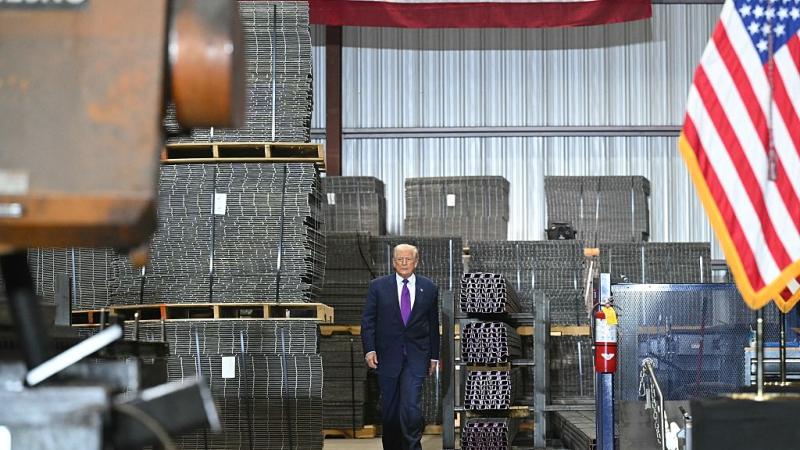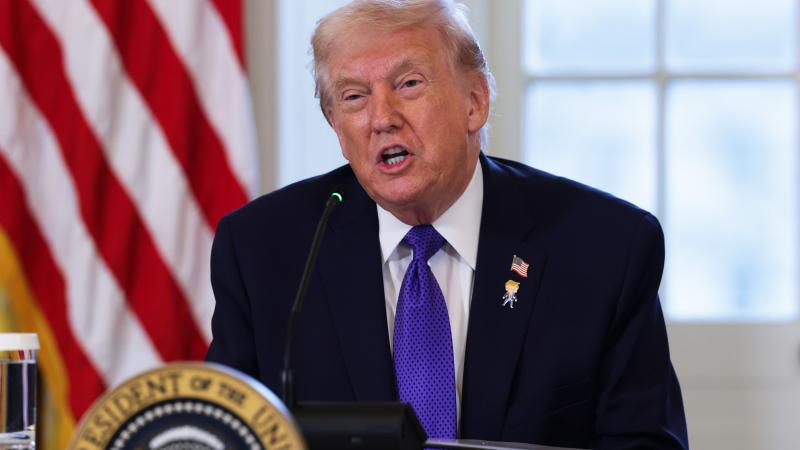Trump, Harris both stump in enemy territory during home stretch as House remains a tossup
Democrats have roundly mocked Trump’s efforts to campaign in blue states, but the campaign offered a similar explanation for its actions to those of Harris, who is in red states such as Texas.
Former President Donald Trump and Vice President Kamala Harris will travel to the bastions of their opposing parties this weekend to shore up support. Some analysts see Trump’s rally in Madison Square Garden – in the heart of deep blue New York – as a sign he is on offense while Harris’s Texas stop seems to indicate she is bleeding support with key Democratic voter blocs.
A New York native, Trump has long insisted that he could flip the state red as the city buckles under the influx of illegal immigration and rising crime. While the Empire State is not expected to be competitive at the national level, it remains the site of key battlegrounds in the struggle for control of the House of Representatives.
Trump is due to hold a Sunday rally at Madison Square Garden, a major venue in the population hub of one of the main Democratic bastions in the country. Trump spent extensive time in the Big Apple during his hush money trial earlier this year, but largely held small campaign stops, with rallies taking place outside the city.
That Trump could conceivably fill the iconic venue in the heart of New York seems to have some Democratic heavyweights rankled. Former Secretary of State Hillary Clinton, for instance, recently appeared on CNN, charging he sought to reenact an infamous 1939 Nazi rally held at the venue.
Trump, for his part, has repeatedly touted former Rep. Lee Zeldin’s, R-N.Y., near-successful gubernatorial run in 2022, which was widely credited with helping down-ballot Republicans to flip competitive districts and take the House. "And so I say to the people of New York, with crime at record levels, with terrorists and criminals pouring in, and with inflation eating your hearts out, vote for Donald Trump. What the hell do you have to lose?” Trump said last month at a rally in Uniondale.
Symbolic relevance
A potentially packed and world-famous venue in the heart of Democratic territory has some symbolic relevance for Trump. With him on the precipice of returning to the White House, a well-attended rally near the site of his unprecedented criminal prosecution could serve as a major rebuke of “weaponized” federal government and “political lawfare” against which he has railed.
Supporting down-ticket candidates
Harris, for her part, traveled to Houston, Texas, for a Friday rally focusing on abortion rights. Texas maintains one of the strictest abortion bans in the country and the issue helped drive Democratic turnout during the 2020 midterms after the overturn of Roe v. Wade.
Texas is not expected to be competitive at the presidential level, though the Senate contest is closer than expected and the Lone Star State is also home to several battleground House contests. Sen. Ted Cruz, R-Texas, a conservative stalwart, also faces a strong challenge in the form of Democratic candidate Colin Allred.
The House races seem to be key draws for the presidential candidates in Texas and New York. The lower chamber’s current composition is near-evenly divided, though Republicans hold a slim majority.
“I am a little surprised Harris is going to Texas as part of her end game, but then Trump keeps holding rallies in New York,” pollster Mark Penn, a former Democratic strategist, told Newsweek.” Both have an interest in not just winning the presidency but in the House and the Senate, and both their visits only make sense in that context.”
Though historically a Republican bastion, Texas has increasingly returned closer margins in presidential races and Democrats continue to invest in the state hoping to ultimately flip its electoral votes. But Democrats appear less concerned with actually winning the state and evidently see the venue as a means of attracting the spotlight.
“Texas is the stage, and the audience is the battlegrounds… It definitely arrests people's attention in a way that is hard to do by just going back to another battleground at this point in the cycle. This is our strategic way to break through the news,” a Harris campaign official told Politico.
The focus on abortion of Harris’s event was part of an effort to shore up support among women by highlighting the consequences of abortion bans, such as Texas’. But Texas’ electorate is emblematic of a broader problem for Harris. With high populations of black and Latino voters as well, – both well-rooted in Christian backgrounds – the state could skew back toward the Republicans as Trump makes inroads with both groups.
Polling data has increasingly shown Trump gaining ground with minorities, especially black men, whom the Harris campaign has struggled to galvanize, despite the personal help of former President Barack Obama.
“Part of it makes me think that, well, you just aren’t feeling the idea of having a woman as president, and you’re coming up with other alternatives and reasons for that,” Obama told a group of black voters this month at an event in Philadelphia.
Avoiding "Trump is Hitler" ads
Falling support for Harris nationally among key voter blocs, moreover, risks harming down-ballot candidates. Indeed, some Senate candidates have begun to distance themselves from Harris and to instead highlight their agreement with Trump in campaign ads.
Sen. Bob Casey, D-Pa., for instance, ran an ad talking about he "sided with Trump to end NAFTA and put tariffs on China to stop them from cheating." Notably, New York's Kirsten Gillibrand has been airing ads proclaiming "people over party" and avoiding the Harris' campaign's latest "Trump is Hitler" narrative.
Trump himself is evidently aware of the implications for competitive House races in heavily partisan states. He previously held a rally in Coachella, Calif., this month. The Golden State is home to many Republican representatives, despite its reliably Democratic status in statewide races.
"California is a paradise lost, but we're bringing it back," he said. "California stood as the beacon of what our country aspired to become. It really did. It had everything. It had the weather. It had the water. The state had the best schools, the safest communities, and a booming middle class. But all that was eradicated by decades of the very policies that Kamala Harris wants to now force upon America.”
Democrats have roundly mocked Trump’s efforts to campaign in blue states, but the campaign offered a similar explanation for its actions to those of Harris.
“The location of his rallies matters less in this nationalized media environment,” Trump Campaign Communications Director Steven Cheung told CNN. “His messaging is making it to all the major media markets regardless of what he does. And the bigger the rally, the more attention it will get, right? I mean, Madison Square Garden? You guys have to cover it.”
















